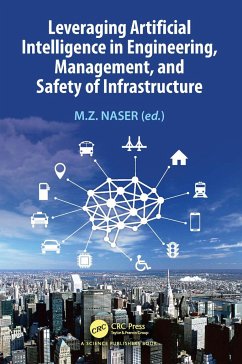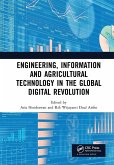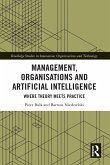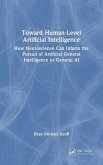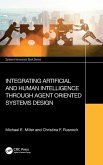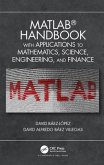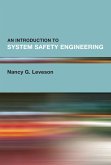Leveraging Artificial Intelligence in Engineering, Management, and Safety of Infrastructure
Herausgeber: Naser, M. Z.
Leveraging Artificial Intelligence in Engineering, Management, and Safety of Infrastructure
Herausgeber: Naser, M. Z.
- Gebundenes Buch
- Merkliste
- Auf die Merkliste
- Bewerten Bewerten
- Teilen
- Produkt teilen
- Produkterinnerung
- Produkterinnerung
This unique book showcases the applications of various sub-fields of artificial intelligence (AI) in engineering, management and safety aspects of infrastructure.
Andere Kunden interessierten sich auch für
![Leveraging the Potential of Artificial Intelligence in the Real World Leveraging the Potential of Artificial Intelligence in the Real World]() Leveraging the Potential of Artificial Intelligence in the Real World154,99 €
Leveraging the Potential of Artificial Intelligence in the Real World154,99 €![Engineering, Information and Agricultural Technology in the Global Digital Revolution Engineering, Information and Agricultural Technology in the Global Digital Revolution]() Engineering, Information and Agricultural Technology in the Global Digital Revolution74,99 €
Engineering, Information and Agricultural Technology in the Global Digital Revolution74,99 €![Management, Organisations and Artificial Intelligence Management, Organisations and Artificial Intelligence]() Piotr Bula (Poland Cracow University of Economics)Management, Organisations and Artificial Intelligence195,99 €
Piotr Bula (Poland Cracow University of Economics)Management, Organisations and Artificial Intelligence195,99 €![Toward Human-Level Artificial Intelligence Toward Human-Level Artificial Intelligence]() Eitan Michael AzoffToward Human-Level Artificial Intelligence165,99 €
Eitan Michael AzoffToward Human-Level Artificial Intelligence165,99 €![Integrating Artificial and Human Intelligence Through Agent Oriented Systems Design Integrating Artificial and Human Intelligence Through Agent Oriented Systems Design]() Michael E. MillerIntegrating Artificial and Human Intelligence Through Agent Oriented Systems Design153,99 €
Michael E. MillerIntegrating Artificial and Human Intelligence Through Agent Oriented Systems Design153,99 €![MATLAB Handbook with Applications to Mathematics, Science, Engineering, and Finance MATLAB Handbook with Applications to Mathematics, Science, Engineering, and Finance]() Jose Miguel David Baez-LopezMATLAB Handbook with Applications to Mathematics, Science, Engineering, and Finance241,99 €
Jose Miguel David Baez-LopezMATLAB Handbook with Applications to Mathematics, Science, Engineering, and Finance241,99 €![Introduction to System Safety Engineering, An Introduction to System Safety Engineering, An]() Nancy G. LevesonIntroduction to System Safety Engineering, An76,99 €
Nancy G. LevesonIntroduction to System Safety Engineering, An76,99 €-
-
-
This unique book showcases the applications of various sub-fields of artificial intelligence (AI) in engineering, management and safety aspects of infrastructure.
Hinweis: Dieser Artikel kann nur an eine deutsche Lieferadresse ausgeliefert werden.
Hinweis: Dieser Artikel kann nur an eine deutsche Lieferadresse ausgeliefert werden.
Produktdetails
- Produktdetails
- Verlag: Taylor & Francis Ltd
- Seitenzahl: 460
- Erscheinungstermin: 17. November 2022
- Englisch
- Abmessung: 240mm x 161mm x 29mm
- Gewicht: 844g
- ISBN-13: 9780367422103
- ISBN-10: 0367422107
- Artikelnr.: 64645114
- Herstellerkennzeichnung
- Libri GmbH
- Europaallee 1
- 36244 Bad Hersfeld
- gpsr@libri.de
- Verlag: Taylor & Francis Ltd
- Seitenzahl: 460
- Erscheinungstermin: 17. November 2022
- Englisch
- Abmessung: 240mm x 161mm x 29mm
- Gewicht: 844g
- ISBN-13: 9780367422103
- ISBN-10: 0367422107
- Artikelnr.: 64645114
- Herstellerkennzeichnung
- Libri GmbH
- Europaallee 1
- 36244 Bad Hersfeld
- gpsr@libri.de
M.Z. Naser is a tenure-track faculty member at the School of Civil and Environmental Engineering & Earth Sciences, a member of the AI Research Institute for Science and Engineering (AIRISE) at Clemson University, USA. Dr. Naser has co-authored over 100 publications and has 10 years of experience in structural engineering and AI. His research interest spans causal & explainable AI methodologies to discover new knowledge hidden within the domains of structural & fire engineering and materials science to realize functional, sustainable, and resilient infrastructure. He is a registered professional engineer and a member of various international editorial boards and building committees.
1. Convolutional Neural Networks and Applications on Civil Infrastructure
2. Identifying Non-linearity in Construction Workers' Personality: Safety
Behaviour Predictive Relationship Using Neural Network and Linear
Regression Modelling 3. Machine Learning Framework for Predicting Failure
Mode and Flexural Capacity of FRP-Reinforced Beams 4. A Novel Formulation
for Estimating Compressive Strength of High Performance Concrete Using Gene
Expression Programming 5. Implementation of Data-Driven Approaches for
Condition Assessment of Structures and Analyzing Complex Data 6. Automatic
Detection of Surface Thermal Cracks in Structural Concrete with Numerical
Correlation Analysis 7. State-of-the-Art Research in the Area of Artificial
Intelligence with Specific Consideration to Civil Infrastructure,
Construction Engineering and Management, and Safety 8. Artificial
Intelligence in Concrete Materials: A Scientometric View 9. Active Learning
Kriging-Based Reliability for Assessing the Safety of Structures: Theory
and Application 10. A Bayesian Estimation Technique for Multilevel Damage
Classification in DBHM 11. Machine learning and IoT Data for Concrete
Performance Testing and Analysis 12. Knowledge-enhanced Deep Learning for
Efficient Response Estimation of Nonlinear Structures 13. Damage Detection
in Reinforced Concrete Girders by Finite Element and Artificial
Intelligence Synergy 14. Deep Learning in Transportation Cyber-Physical
Systems 15. Artificial Intelligence in the Construction Industry: Theory
and Emerging Applications for the Future of Work 16. The Use of Machine
Learning in Heat Transfer Analysis for Structural Fire Engineering
Applications 17. Using Artificial Intelligence to Derive Temperature
Dependent Mechanical Properties of Ultra-High Performance Concrete 18.
Smart Tunnel Fire Safety Management by Sensor Network and Artificial
Intelligence
2. Identifying Non-linearity in Construction Workers' Personality: Safety
Behaviour Predictive Relationship Using Neural Network and Linear
Regression Modelling 3. Machine Learning Framework for Predicting Failure
Mode and Flexural Capacity of FRP-Reinforced Beams 4. A Novel Formulation
for Estimating Compressive Strength of High Performance Concrete Using Gene
Expression Programming 5. Implementation of Data-Driven Approaches for
Condition Assessment of Structures and Analyzing Complex Data 6. Automatic
Detection of Surface Thermal Cracks in Structural Concrete with Numerical
Correlation Analysis 7. State-of-the-Art Research in the Area of Artificial
Intelligence with Specific Consideration to Civil Infrastructure,
Construction Engineering and Management, and Safety 8. Artificial
Intelligence in Concrete Materials: A Scientometric View 9. Active Learning
Kriging-Based Reliability for Assessing the Safety of Structures: Theory
and Application 10. A Bayesian Estimation Technique for Multilevel Damage
Classification in DBHM 11. Machine learning and IoT Data for Concrete
Performance Testing and Analysis 12. Knowledge-enhanced Deep Learning for
Efficient Response Estimation of Nonlinear Structures 13. Damage Detection
in Reinforced Concrete Girders by Finite Element and Artificial
Intelligence Synergy 14. Deep Learning in Transportation Cyber-Physical
Systems 15. Artificial Intelligence in the Construction Industry: Theory
and Emerging Applications for the Future of Work 16. The Use of Machine
Learning in Heat Transfer Analysis for Structural Fire Engineering
Applications 17. Using Artificial Intelligence to Derive Temperature
Dependent Mechanical Properties of Ultra-High Performance Concrete 18.
Smart Tunnel Fire Safety Management by Sensor Network and Artificial
Intelligence
1. Convolutional Neural Networks and Applications on Civil Infrastructure
2. Identifying Non-linearity in Construction Workers' Personality: Safety
Behaviour Predictive Relationship Using Neural Network and Linear
Regression Modelling 3. Machine Learning Framework for Predicting Failure
Mode and Flexural Capacity of FRP-Reinforced Beams 4. A Novel Formulation
for Estimating Compressive Strength of High Performance Concrete Using Gene
Expression Programming 5. Implementation of Data-Driven Approaches for
Condition Assessment of Structures and Analyzing Complex Data 6. Automatic
Detection of Surface Thermal Cracks in Structural Concrete with Numerical
Correlation Analysis 7. State-of-the-Art Research in the Area of Artificial
Intelligence with Specific Consideration to Civil Infrastructure,
Construction Engineering and Management, and Safety 8. Artificial
Intelligence in Concrete Materials: A Scientometric View 9. Active Learning
Kriging-Based Reliability for Assessing the Safety of Structures: Theory
and Application 10. A Bayesian Estimation Technique for Multilevel Damage
Classification in DBHM 11. Machine learning and IoT Data for Concrete
Performance Testing and Analysis 12. Knowledge-enhanced Deep Learning for
Efficient Response Estimation of Nonlinear Structures 13. Damage Detection
in Reinforced Concrete Girders by Finite Element and Artificial
Intelligence Synergy 14. Deep Learning in Transportation Cyber-Physical
Systems 15. Artificial Intelligence in the Construction Industry: Theory
and Emerging Applications for the Future of Work 16. The Use of Machine
Learning in Heat Transfer Analysis for Structural Fire Engineering
Applications 17. Using Artificial Intelligence to Derive Temperature
Dependent Mechanical Properties of Ultra-High Performance Concrete 18.
Smart Tunnel Fire Safety Management by Sensor Network and Artificial
Intelligence
2. Identifying Non-linearity in Construction Workers' Personality: Safety
Behaviour Predictive Relationship Using Neural Network and Linear
Regression Modelling 3. Machine Learning Framework for Predicting Failure
Mode and Flexural Capacity of FRP-Reinforced Beams 4. A Novel Formulation
for Estimating Compressive Strength of High Performance Concrete Using Gene
Expression Programming 5. Implementation of Data-Driven Approaches for
Condition Assessment of Structures and Analyzing Complex Data 6. Automatic
Detection of Surface Thermal Cracks in Structural Concrete with Numerical
Correlation Analysis 7. State-of-the-Art Research in the Area of Artificial
Intelligence with Specific Consideration to Civil Infrastructure,
Construction Engineering and Management, and Safety 8. Artificial
Intelligence in Concrete Materials: A Scientometric View 9. Active Learning
Kriging-Based Reliability for Assessing the Safety of Structures: Theory
and Application 10. A Bayesian Estimation Technique for Multilevel Damage
Classification in DBHM 11. Machine learning and IoT Data for Concrete
Performance Testing and Analysis 12. Knowledge-enhanced Deep Learning for
Efficient Response Estimation of Nonlinear Structures 13. Damage Detection
in Reinforced Concrete Girders by Finite Element and Artificial
Intelligence Synergy 14. Deep Learning in Transportation Cyber-Physical
Systems 15. Artificial Intelligence in the Construction Industry: Theory
and Emerging Applications for the Future of Work 16. The Use of Machine
Learning in Heat Transfer Analysis for Structural Fire Engineering
Applications 17. Using Artificial Intelligence to Derive Temperature
Dependent Mechanical Properties of Ultra-High Performance Concrete 18.
Smart Tunnel Fire Safety Management by Sensor Network and Artificial
Intelligence

